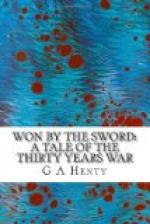“No doubt whatever. It depends upon Enghien, though no doubt the marshal will throw every obstacle in the way. In the first place, there can be no denying that the Spanish infantry are superb, and that Fuentes, who commands them, is a fine old soldier, while our infantry are largely composed of new levies. Thus, though the armies are not unequal in strength, l’Hopital may well consider the chances of victory to be against us. In the second place, in a battle Enghien will be in command, and though all of us recognize that he possesses extraordinary ability, his impetuosity might well lead to a disaster. Then the marshal must feel that while the glory of a victory would fall to Enghien, the discredit of a defeat would be given to him, while if aught happened to Enghien himself the wrath of Conde and his faction would bring about his disgrace.
“I doubt not that he has received instructions not to hazard a battle except under extraordinary circumstances, while Enghien would, if possible, bring one about under any circumstances whatever. Lastly, the king is desperately ill, ill unto death, some say, and none can foretell what would take place were we to suffer a heavy defeat while France is without some great head to rally the nation and again show face to the Spaniards. At the same time, I may tell you at once, that in this matter I am heart and soul with Enghien. I consider that did we shrink from battle now, it would so encourage Spain and Austria that they would put such a force in the field as we could scarcely hope to oppose, while a victory would alter the whole position and show our enemies that French soldiers are equal to those of Spain, which at present no one believes. And lastly, if we win, Enghien, when his father dies, will be the foremost man in France, the leading spirit of the princes of the blood, and having behind him the vast possessions and wealth accumulated by Conde, will be a power that even the greatest minister might dread, and I need hardly say that my marshal’s baton would be very appreciably nearer than it is at present.”
“Then I may take it,” Hector said with a smile, “that the chances are in favour of a pitched battle.”
“That is certainly so; l’Hopital’s instructions are to force the Spaniards, who have advanced against Rocroi, to raise the siege, but to do so if possible by manoeuvering, and to avoid anything like a pitched battle. But I fancy that he is likely to find circumstances too strong for him, and that one of these mornings we shall stand face to face with the enemy.
The Spaniards are doubtless grand soldiers, and the army we shall meet is largely composed of veteran troops; but we must remember that for years and years the Dutchmen, by nature peaceable and for the most part without training in arms, and although terribly deficient in cavalry, have boldly withstood the power of Spain.”
“They seldom have met them in the open field,” Hector said doubtfully.




